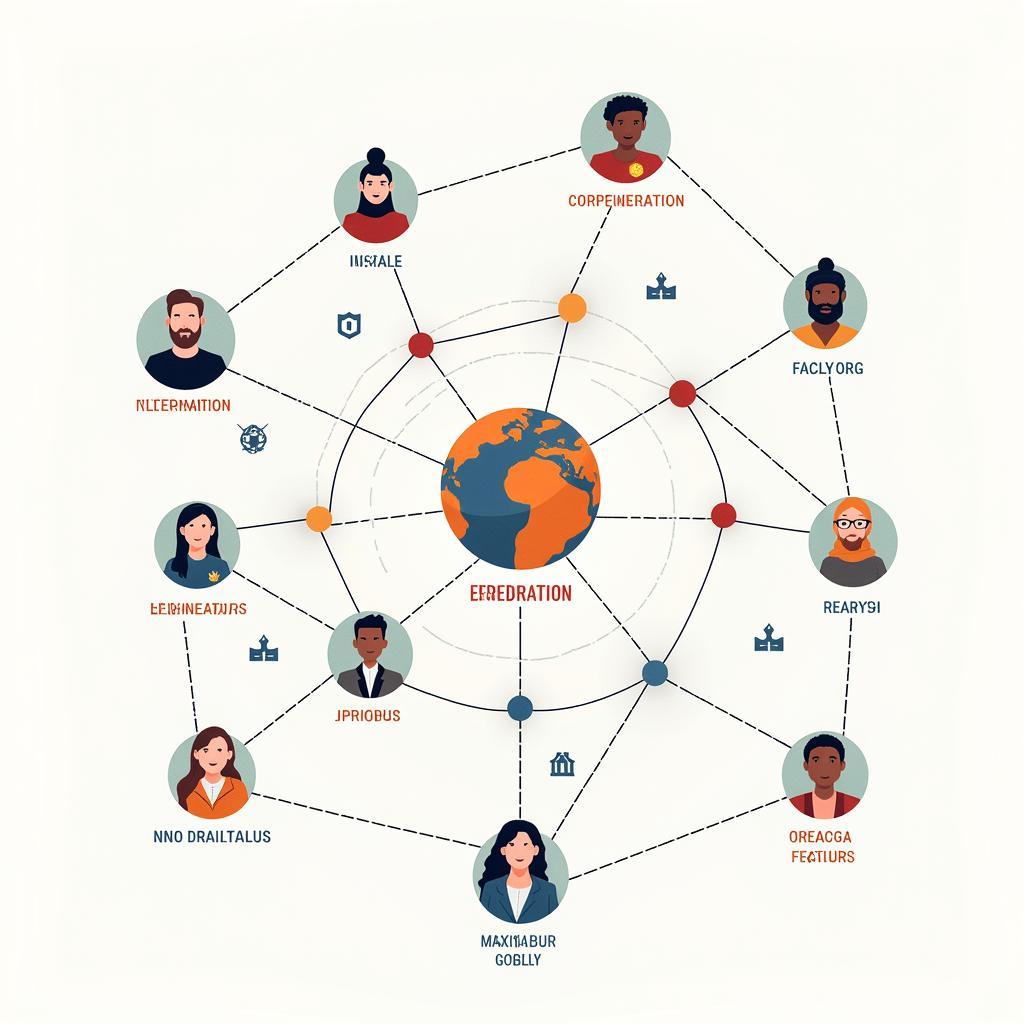Global civil society plays a crucial role in shaping international relations and advocating for positive change. Understanding how this complex network operates is key to appreciating its impact. This article delves into the mechanisms, actors, and challenges that define global civil society, exploring its influence on various global issues.
Understanding the Mechanisms of Global Civil Society
Global civil society encompasses a vast array of non-governmental organizations (NGOs), activist groups, social movements, and individuals working across borders to address common concerns. How Does Global Civil Society Work? It functions through a complex interplay of advocacy, information sharing, and collective action. NGOs often play a central role, conducting research, providing humanitarian aid, and lobbying governments and international organizations. Activist groups mobilize public opinion and exert pressure on decision-makers. Social movements, often fueled by grassroots initiatives, can drive significant social and political change. The internet and social media have become essential tools for connecting individuals and organizations, facilitating communication, and amplifying voices across geographical boundaries.
 Global Civil Society Network
Global Civil Society Network
The Role of Advocacy and Information Sharing
Advocacy is a cornerstone of global civil society. Organizations and individuals engage in various advocacy activities, including lobbying, public campaigns, and legal action, to influence policy decisions and promote human rights, environmental protection, and other critical issues. Information sharing is equally crucial. By disseminating information and raising awareness about global challenges, global civil society empowers individuals to take action and holds powerful actors accountable. This sharing can happen through reports, documentaries, social media campaigns, and educational initiatives. how does photography impact society can be a powerful tool for advocacy and sharing information.
Key Actors in Global Civil Society
The landscape of global civil society is populated by diverse actors, each with its own strengths and limitations. Large international NGOs, such as Amnesty International and Greenpeace, possess significant resources and expertise, enabling them to operate on a global scale. Smaller, local organizations often have deeper roots in their communities and can effectively address specific local needs. Furthermore, individual activists and social movements play a vital role in challenging the status quo and driving social change.
Collaboration and Partnerships: The Power of Collective Action
Global civil society thrives on collaboration. Partnerships between different organizations, as well as between civil society and governments or businesses, can amplify impact and create synergistic effects. By pooling resources and expertise, actors can address complex challenges more effectively. This collaborative spirit is essential for achieving shared goals and building a more just and sustainable world. Think about the impact music has on society – it unites people across borders, much like global civil society.
 Global Civil Society Collaboration
Global Civil Society Collaboration
Challenges Facing Global Civil Society
Despite its potential, global civil society faces numerous challenges. Funding constraints can hinder the effectiveness of organizations, particularly smaller ones. Political restrictions and repression in some countries limit the space for civil society to operate freely. Furthermore, ensuring accountability and transparency within civil society organizations is an ongoing concern. Navigating the complexities of international relations and building consensus among diverse actors can also be challenging. The impact of religion on society can also be a factor in the challenges faced by global civil society.
Overcoming Challenges and Building a Stronger Future
To overcome these challenges, global civil society needs to adapt and innovate. Diversifying funding sources, embracing technology, and strengthening internal governance are essential steps. Building stronger partnerships and fostering greater collaboration within civil society and with other sectors can also enhance effectiveness. society and culture _____. are constantly evolving, and global civil society needs to stay relevant and adapt to these changes.
 Global Civil Society's Future
Global Civil Society's Future
“Effective global civil society action requires not only strong advocacy but also a deep understanding of the local context,” says Dr. Anya Sharma, a leading expert in international development.
In conclusion, understanding how global civil society works is vital for anyone seeking to engage in positive change on a global scale. While challenges exist, the power of collective action, driven by diverse actors and innovative approaches, offers hope for a more just and sustainable future. Understanding how global civil society works can also be beneficial to organizations like the jefferson educational society erie pa.
FAQs:
- What is the main purpose of global civil society?
- How can individuals contribute to global civil society?
- What are some examples of successful global civil society campaigns?
- How is technology impacting global civil society?
- What are the biggest challenges facing global civil society today?
- What are some ways to strengthen global civil society?
- How can I get involved in global civil society initiatives?
Other questions you might ask:
- How does global civil society interact with governments?
- What is the role of philanthropy in global civil society?
- How does global civil society address issues of inequality and injustice?
Explore further with these related articles on our website:
- How does photography impact society?
- The impact music has on society
- Society and Culture
Need support? Contact us 24/7: Phone: 02043854663, Email: [email protected], or visit us at Khu 34, Bắc Giang, 260000, Vietnam.